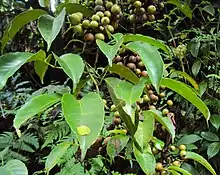| Tetrastigma leucostaphylum | |
|---|---|
 | |
| Scientific classification | |
| Kingdom: | Plantae |
| Clade: | Tracheophytes |
| Clade: | Angiosperms |
| Clade: | Eudicots |
| Clade: | Rosids |
| Order: | Vitales |
| Family: | Vitaceae |
| Genus: | Tetrastigma |
| Species: | T. leucostaphylum |
| Binomial name | |
| Tetrastigma leucostaphylum | |
| Synonyms[1] | |
| |
Tetrastigma leucostaphylum, the Indian chestnut vine,[2] is a flowering plant in the family Vitaceae. It is native to Sri Lanka,[3] India, Nepal and South East Asia.[1][2]
Ecology
Relationship with Rafflesia
In Sumatra, Tetrastigma leucostaphylum serves as host for the world's largest flower, the parasitic plant Rafflesia arnoldii.[4] In Rafflesia Forest Reserve in Borneo, Tetrastigma leucostaphylum hosts Rafflesia pricei.[5]
References
- 1 2 3 "Tetrastigma leucostaphylum". Plants of the World Online. Royal Botanic Gardens, Kew. Retrieved 4 September 2021.
- 1 2 "Indian Chestnut Vine".
- ↑ "Tetrastigma leucostaphylum". Tropicos. Retrieved 3 August 2017.
- ↑ Pranata, Syafroni; Sulistijorini; Chikmawati, Tatik (September 2019). "Ecology of Rafflesia arnoldii (Rafflesiaceae) in Pandam Gadang, West Sumatra". Journal of Tropical Life Science. 9 (3): 243–251. doi:10.11594/jtls.09.03.05. Retrieved 4 September 2021.
- ↑ Chung, Arthur Y.C.; Chew, Steven K.F.; Majapun, Richard; Nilus, Reuben & Kugan, Frederick (July 2012). Rafflesia Forest Reserve: Conserving not only Rafflesia but also endemic, rare and interesting insects. International Biological Symposium. Serdang, Malaysia. Retrieved 6 November 2023.
This article is issued from Wikipedia. The text is licensed under Creative Commons - Attribution - Sharealike. Additional terms may apply for the media files.